
New York Times Best-Selling Author
Mary Cay Ricci and
Margaret Lee

PRUFROCK PRESS INC.
WACO, TEXAS
Copyright 2016, Prufrock Press Inc.
Edited by Lacy Compton
Cover and layout design by Raquel Trevino
Author photograph (p. 167) courtesy of Doug Donegan, Wanderstock Photography
ISBN-13: 978-1-61821-526-0
No part of this book may be reproduced, translated, stored in a retrieval system, or transmitted, in any form or by any means, electronic, mechanical, photocopying, microfilming, recording, or otherwise, without written permission from the publisher.
At the time of this books publication, all facts and figures cited are the most current available. All telephone numbers, addresses, and website URLs are accurate and active. All publications, organizations, websites, and other resources exist as described in the book, and all have been verified. The author and Prufrock Press Inc. make no warranty or guarantee concerning the information and materials given out by organizations or content found at websites, and we are not responsible for any changes that occur after this books publication. If you find an error, please contact Prufrock Press Inc.
 | Prufrock Press Inc.
P.O. Box 8813
Waco, TX 76714-8813
Phone: (800) 998-2208
Fax: (800) 240-0333
http://www.prufrock.com |
TABLE OF CONTENTS
DEDICATION
For my husband, Enio Ricci, with love to my partner in parenting.
For my kids, Christopher, Patrick, and IsabellaLive your life with a growth mindset!
For my parents, Joe and Mary Ellen Marchione, with gratitude.
For my mother-in-law, Vincenzina Ricci, a selfless and loving mother and grandmother, whom we lost (and heaven welcomed) on February 9, 2016.
Mary Cay/Mom
For my parents, Katherine Lee and the late David Lee, with love, gratitude, and admiration.
Meg
ACKNOWLEDGMENTS
Both authors wish to thank:
 Jamie Aliveto, Cindy Alvarado, Michele Baisey, Troy Baisey, Carol Bates, Kristen Canning, Linda Civetti, Maureen Corio, Eric Haines, Tracy Hilliard, Karine Myers, Kristine Pearl, Cheryl Peters, Donna Quatman-Wilder, Eric Rhodes, Mary Jo Richmond, Barbara Rudakevych, Brett Stark, Angela Thomas, Jodi Vallaster, Brian Vasquenza, and the participants in the Frederick County Title I Family Involvement Team.
Jamie Aliveto, Cindy Alvarado, Michele Baisey, Troy Baisey, Carol Bates, Kristen Canning, Linda Civetti, Maureen Corio, Eric Haines, Tracy Hilliard, Karine Myers, Kristine Pearl, Cheryl Peters, Donna Quatman-Wilder, Eric Rhodes, Mary Jo Richmond, Barbara Rudakevych, Brett Stark, Angela Thomas, Jodi Vallaster, Brian Vasquenza, and the participants in the Frederick County Title I Family Involvement Team.
 Jeff Colsh, Anthony Welch, principal Lee Jeffrey, and the Middletown High School boys soccer program.
Jeff Colsh, Anthony Welch, principal Lee Jeffrey, and the Middletown High School boys soccer program.
 Kearney Blandamer, Lesley Stroot, acting principal Kimberly Boldon, and the Wootton High School field hockey program.
Kearney Blandamer, Lesley Stroot, acting principal Kimberly Boldon, and the Wootton High School field hockey program.
 Monique, Patrice, Noelle, and Cain.
Monique, Patrice, Noelle, and Cain.
Meg Lee wishes to thank:
 My familythe Donegans, the Guineys, the Lees, the Pences, and the Pennsfor love, laughter, support, and encouragement.
My familythe Donegans, the Guineys, the Lees, the Pences, and the Pennsfor love, laughter, support, and encouragement.
 My Frederick County Public Schools family, led by Dr. Theresa Alban and Dr. Michael Markoe, for embracing the growth mindset and demonstrating every day the power of a growth mindset school district.
My Frederick County Public Schools family, led by Dr. Theresa Alban and Dr. Michael Markoe, for embracing the growth mindset and demonstrating every day the power of a growth mindset school district.
 Paul Dunford, Susan Garrett, Tracey Lucas, and Marty Rochlin, who taught me to have a growth mindset before Carol Dweck even coined the term.
Paul Dunford, Susan Garrett, Tracey Lucas, and Marty Rochlin, who taught me to have a growth mindset before Carol Dweck even coined the term.
CHAPTER 1
WHAT ARE MINDSETS AND HOW DO THEY AFFECT OUR CHILDREN?
I want to make sure my children never stop learning!
Gina, parent of three
Have you ever caught yourself thinking any of the following about your children?
 Poor thing, she isnt very good at math. She must have gotten that from me.
Poor thing, she isnt very good at math. She must have gotten that from me.
 He takes after me in his sports ability.
He takes after me in his sports ability.
 Math and science are his strengths. He doesnt do well in literature.
Math and science are his strengths. He doesnt do well in literature.
The way we think about and react to our children depends on our mindset.
What are mindsets? Thanks to the research of Dr. Carol Dweck, Stanford University professor of psychology, society is going through a shift in thinking about learning and intelligence. Dweck (2006) described a belief system that asserts that intelligence can be developed and coined the term growth mindset. Parents with a growth mindset believe that their children can achieve at higher levelswith effort, perseverance, and resiliency. Learners with a growth mindset believe that they can grow their intelligence with hard work and learn just about anything. It might take some struggle and some failure, but they understand that with effort and perseverance, they can grow and succeed. Growth mindset adults and children focus on the learning, growth, and improvementnot the grades or trophies, not on looking smart or talented. A growth mindset home environment encapsulates the philosophy that there is enough success for everyone. Both parents and children learn about the malleability of the brain and what can happen as a result of practice, perseverance, resiliency, and grit.
Conversely, Dweck coined the term fixed mindset, which is a belief system in which one believes that intelligence is something you are born withit is genetic, it is innateand although everyone can learn new things, your innate level of intelligence cannot be changed. A person with a fixed mindset might believe that he or she has predetermined smarts or talents in a particular area, but not in other areas. A child or adult with a fixed mindset might believe that he or she will never be good in a particular subject or talent or be afraid to try something that he or she thinks is too difficult or at which he or she fears failure. For people who do not perceive themselves as smart, it becomes a self-fulfilling prophecy.
It is important to avoid classifying people into fixed mindset or growth mindset categories. Rarely does anyone fit 100% into a categorywe are certain degrees of each, depending on the situation. We know of a teacher who has a very growth mindset when it comes to her students and her teaching. She believes that they can increase their skills and abilities in a variety of different areas and her classroom is a space where the word cant is rarely spoken. This teacher expects each student to put forth great effort and believes that all can achieve at a high level. She is a model growth mindset teacher; however, at home, she transitions into a fixed mindset thinker when it comes to her cooking skills. In fact, she is so sure that she cant cook, she unplugged her oven and uses it to store her books!

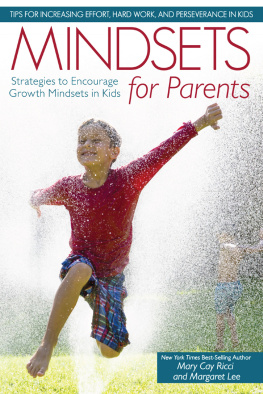
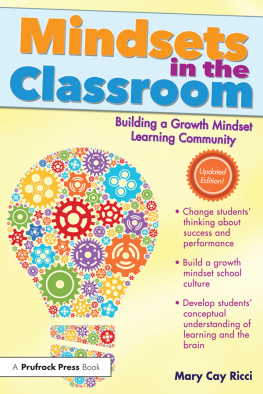
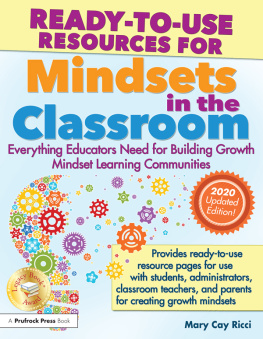

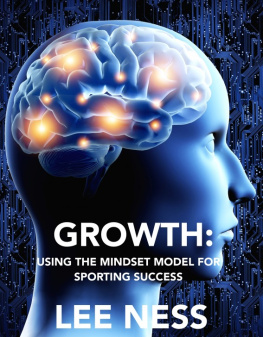
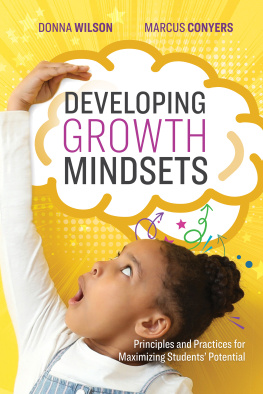
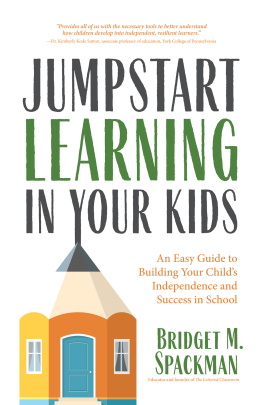
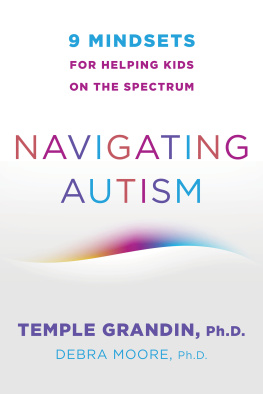
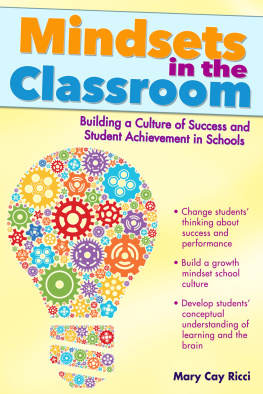
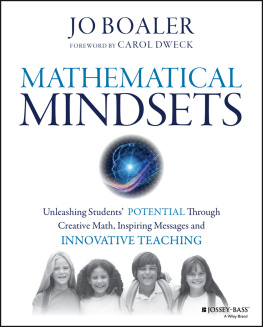





 Jamie Aliveto, Cindy Alvarado, Michele Baisey, Troy Baisey, Carol Bates, Kristen Canning, Linda Civetti, Maureen Corio, Eric Haines, Tracy Hilliard, Karine Myers, Kristine Pearl, Cheryl Peters, Donna Quatman-Wilder, Eric Rhodes, Mary Jo Richmond, Barbara Rudakevych, Brett Stark, Angela Thomas, Jodi Vallaster, Brian Vasquenza, and the participants in the Frederick County Title I Family Involvement Team.
Jamie Aliveto, Cindy Alvarado, Michele Baisey, Troy Baisey, Carol Bates, Kristen Canning, Linda Civetti, Maureen Corio, Eric Haines, Tracy Hilliard, Karine Myers, Kristine Pearl, Cheryl Peters, Donna Quatman-Wilder, Eric Rhodes, Mary Jo Richmond, Barbara Rudakevych, Brett Stark, Angela Thomas, Jodi Vallaster, Brian Vasquenza, and the participants in the Frederick County Title I Family Involvement Team.